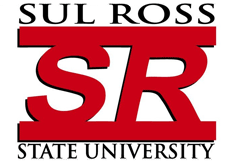SWASAP
Sul Ross State University McNair Scholar Researches Media’s Effects on Political Awareness
Posted by McNair Scholars Program on Saturday, August 29, 2015 4:22 - 0 Comments
Dannielle Vaughn’s McNair Program research seeks to measure how the media, especially TV, affects political awareness/involvement in the local community.
 Vaughn, Odessa, will graduate from Sul Ross State University in December with a Bachelor’s degree in Political Science. In the meantime, she is studying “The Effect of Pluralized Media on the Political Sophistication of Local Citizens of Alpine.” David Watson, assistant professor of Political Science, is her mentor.
Vaughn, Odessa, will graduate from Sul Ross State University in December with a Bachelor’s degree in Political Science. In the meantime, she is studying “The Effect of Pluralized Media on the Political Sophistication of Local Citizens of Alpine.” David Watson, assistant professor of Political Science, is her mentor.
“I am always interested in how people are affected visually, how an image can change beliefs or perception,” said Vaughn. “TV is present everywhere. My personal experience of not getting the full extent of a story shows how viewers can be misinformed by fleeting images. Misinformation leads to changed perceptions, which can cause people to become engaged or disengaged.”
Vaughn compiled a 30-question survey of media consumption and political knowledge. The survey included photographs of local, state and national officials to be identified by respondents. Over 160 persons, including Sul Ross students and community residents, responded.
“The survey contained no right or wrong answers,” said Vaughn. “We were seeking honest opinions on how they (respondents) were affected by the news. Depending on responses, including which election – national, Congressional, state or local – were deemed most important, respondents were assigned a political sophistication score.
“The results were mixed in the sense that they weren’t what I anticipated, but they did paint a very interesting picture,” Vaughn said. “The proposed pipeline question I added in the day before the survey was what was most mixed and not anticipated. The next biggest finding was that hard news significantly impacted the sophistication scores negatively.”
Results contradicted expectations, Vaughn said.
“I expected that those who were able to correctly answer the pipeline question were those who scored higher on the local sophistication score and that was not what we found. To sum it up, we found that citizens who are engaged more locally actually have a higher national sophistication score and the lowest local sophistication scores.”
“This research project and the survey to understand the effect of media on political awareness contained no right or wrong answers,” said Vaughn. “Citizens are not right nor wrong in their media preferences, and that is easily lost with the results.”
Watson added, “When Danie first approached me with an idea to survey local vs. national media consumption and the impact each has on political sophistication, I immediately thought it was an interesting project and was curious to know the results.”
“The vast majority of the published research in political science and the media deals with hard news and national sophistication, so having a focus on local media sources and knowledge of local issues, especially in an enclave like Alpine, Texas, was an interesting twist.”
After graduation, Vaughn plans to enroll in a Political Science Ph.D. program, with Texas Tech University or the University of Utah her preferred locations. She praised her McNair Program participation.
“It has been humbling in the sense that you never know what you are going to find. Sometimes, what you find can be scary. I am learning how to face these challenges and to be bold, tactful and honest.”
“I have so much more to learn about things I thought I knew about,” she said. “McNair has given me the tools to use mistakes so future research will be better and more accurate, and to learn how to respect and read others’ research in the same manner.”
The Ronald E. McNair Postbaccalaureate Achievement Program is designed to encourage first generation, low-income students and minority undergraduates to consider careers in college teaching as well as prepare for doctoral study. Students who participate in the program are provided with research opportunities and faculty mentors.
Named in honor of the astronaut who died in the 1986 space-shuttle explosion, the program was established at Sul Ross in November 2007. It is funded through the Department of Education’s TRIO programs.
This article was originally posted on July 31, 2015 on Odessa American. Click here to read the original article.